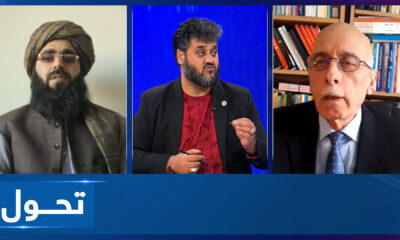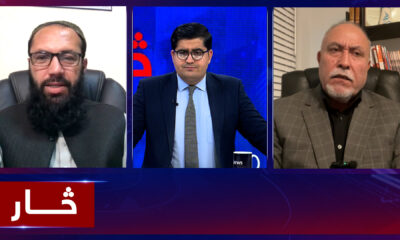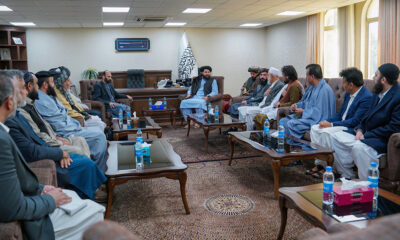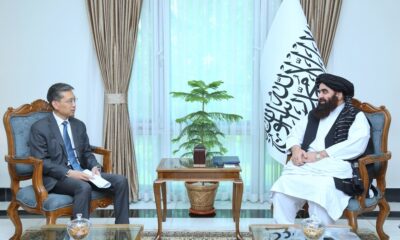Latest News
Voices raised over killings as #StopHazaraGenocide trends on Twitter
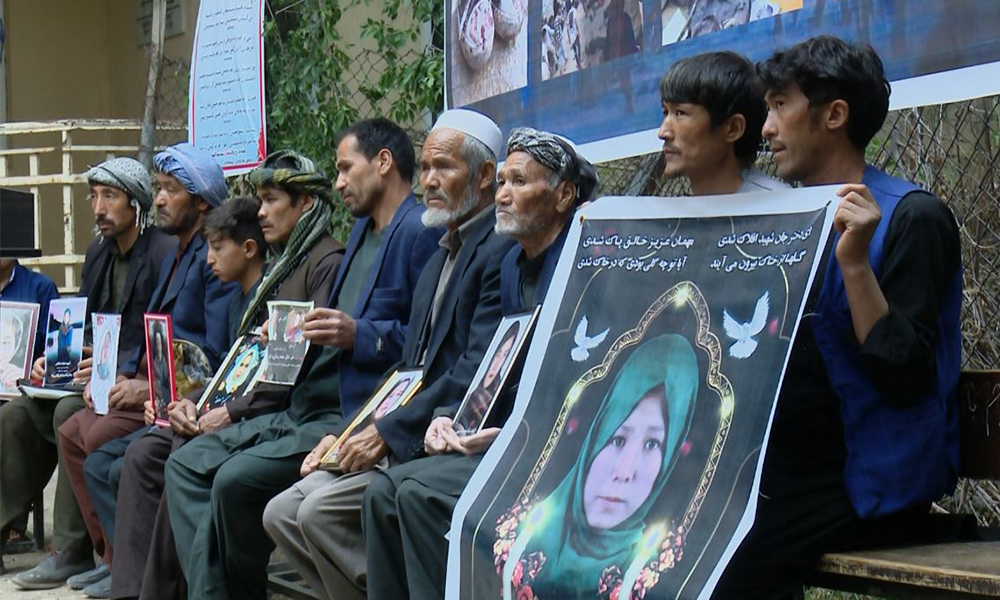
Following a surge in targeted attacks against civilians in the predominately Shiite Hazara community in the western suburbs of Kabul city, tens of thousands of people have taken to social media calling on the Afghan government to recognize the attacks as acts of genocide.
The hashtag #StopHazaraGenocide has been trending over the past few days and by Saturday night had topped 100,000 tweets alone.
This comes amid ongoing attacks against the Hazara community – attacks that have over the past few years left hundreds of civilians dead and hundreds more wounded.
One Afghan woman said on Twitter “The systematic killing of Hazaras in Afghanistan is a clear example of genocide.”
Another Twitter user said: “Every day Hazara are digging a new mass grave to bury their loved ones. The hills of Kabul turned into a wasteland of despair where newborns, schoolgirls and mothers have been laid forever.
“Those who work for human rights and peace must today stand up and help us to #StopHazaraGenocide,” he said.
Another Twitter user stated: “The normalization of violence against Hazaras, the denial of the systematic persecution of a community simply because they belong to a particular ethnicity is the untold & rather unpopular truth of what is happening with Hazaras in Afghanistan.”
Dozens posted tallies around the death toll going back to 2018 – while many said that these attacks had been carried out by the Taliban, Daesh and other terrorist groups in the presence of US and NATO forces.
Referring to the UN convention on the Prevention and Punishment of the Crime of Genocide, a number of people stated that the attacks on Hazaras must be recognized as an act of genocide.
According to the UN Genocide Convention Article 11, any of the following acts committed with intent to destroy, in whole or in part, a national, ethnical, racial or religious group, as such: Killing members of the group; Causing serious bodily or mental harm to members of the group; Deliberately inflicting on the group conditions of life calculated to bring about its physical destruction in whole or in part; Imposing measures intended to prevent births within the group; Forcibly transferring children of the group to another group can be counted as genocide.
A number of Afghans stated that though all people in Afghanistan have been victims of terrorism, “the Hazaras have been constantly targeted for their ethnicity.”
Musa Zafar, an Afghan author, stated: “If you ask which ethnic group has suffered the most casualties in Afghanistan in the last twenty years, you can expect Pashtuns as an answer. Pashtuns have been killed on both sides of the conflict. Their children have been deprived of basic rights. But the targeted killings of Hazaras are an example of genocide.”
“The world should know that the Taliban and their like-minded terrorists are committing genocide along with countless other crimes [in Afghanistan],” he said.
A member of the Afghan Republic peace team, Mohammad Amin Ahmadi, said Saturday the voice of victims must be heard.
“It is a reality that the Hazara people are subject to genocide because they are being killed for their ethnic and religious identity,” Ahmadi said.
Shuja Zaky, TOLONews Anchor, stated that “targeting civilians anywhere and on all sides is condemned and deeply disturbing. But targeted attacks on Hazaras have gravely increased this concern.”
MP Arif Rahmani stated: “The world should not close its eyes to this systematic genocide.”
Parwiz Shamal, an Afghan journalist, said: “In Afghanistan, all ethnic groups have been harmed – Hazaras, Tajik Pashtuns, Uzbeks … but the fact cannot be ignored that seniors, young people, and children – even newborn babies – of no ethnic group like the Hazaras have been targeted just because of their ethnicity and have been slaughtered.”
This growing hashtag campaign, #StopHazaraGenocide comes after four private passenger vehicles were targeted in explosions in the densely Hazara-populated area in the west of Kabul city this week.
Dozens of people including Ariana News Anchor Mina Khairi, who was a Hazara herself, were killed in the bombings.
Tomas Niklasson, Acting Special Envoy of the European Union for Afghanistan, on Thursday spoke out about this and said that “targeting Hazaras” must be stopped.
Niklasson meanwhile also met with survivors of the deadly bombing at the Sayed-ul-Shuhada school in early May. Over 90 people, mostly schoolgirls, were killed when explosions were detonated at the school in Dasht-e-Barchi in Kabul – which is also a densely populated Hazara community.
Niklasson stated that crimes were committed and that these must be investigated.
“Targeting Hazaras must stop and crimes [must] be investigated,” he said.
He also noted that some people want to stop the grieving of Sayed-ul-Shuhada students, but that “their memory can be honored by pursuing dreams.”
“Those taken away too early can’t be brought back. But their memory can be honored by pursuing dreams that some want to stop,” he stated.
So far, no group including the Taliban has claimed responsibility for the attack.
Recently the Afghanistan Independent Human Rights Commission (AIHRC) called on the Afghan government to grant special protection to Hazaras and the community in Dasht-e-Barchi.
The AIHRC said in a statement that it was the government’s duty to protect the Hazara community against crimes against humanity, ethnic cleansing, and genocide.
“The Afghan government has an obligation under International Humanitarian Law (IHL) and International Human Rights Law to protect the population at risk of war crimes, crimes against humanity, ethnic cleansing or genocide and international law obliges the government to take measures to end and prevent genocide and war crimes, crimes against humanity and persecution on the basis of ethnicity and gender,” the statement read.
“In October 2020, just over six months ago, more than 40 students died in an attack on Kawsar Danish tutoring center. In May 2020, almost a year ago 11 mothers were murdered with their unborn babies, two boys were, and an Afghan midwife was killed, with five mothers injured; this is femicide and infanticide,” the statement highlighted.
The AIHRC stressed that the Afghan government should fulfill its obligations under the International Covenant on Civil and Political Rights “which includes acknowledging massacres targeting Hazaras.”
“The Afghan government should immediately communicate a human rights-based protection plan for Dasht-e-Barchi and West Kabul. This should include plans for collective reparations,” the organization said.
One of the world’s most persecuted peoples
In a recent opinion article, in The Diplomat, by two political commentators, who are both former Afghan refugees, Sitarah Mohammadi and Sajjad Askary said the Hazara community “wears the sad reputation of being one of the world’s most persecuted peoples.”
They pointed out that while Hazaras now make up roughly a quarter of Afghanistan’s population of 38 million, they were once the largest Afghan ethnic group, constituting nearly 67 percent of the total population.
“The decline is due to the sad history of the Hazaras. Sanctioned state persecution against the Hazara began in the late 19th century. Since that time about 60 percent of the Hazara population has been eliminated in different ways: killed, sold into slavery, or forced into exile,” they wrote.
The Taliban’s massacre of thousands of Hazaras in Mazar-e Sharif in 1998 remains one of the most notorious atrocities in Afghanistan’s 40-year conflict, Mohammadi and Askary wrote.
They stated that members of Afghanistan’s Hazara community remain continually vulnerable to violence and that Hazara culture promotes democratic values of social liberalism and progressive thinking, and the community has embraced expanded educational opportunities.
“These cultural distinctions are at odds with the predominantly conservative religious views of wider Afghan society, and particularly with the Taliban. The Hazaras’ success, strides and liberation pose a threat to ethnocentric circles,” they wrote.
According to Mohammadi and Askary, the genocidal persecution of the Hazara people is maintained in contemporary attitudes throughout Afghanistan.
“Attacks against newborn Hazara babies, pregnant mothers, school children, girls, and youth are a matter of record. Hazaras have faced violence at educational centers and schools, fitness centers, wedding halls, and maternity wards.”
They also noted that “understandably, the persecution of the Hazaras has resulted in thousands seeking refuge across international borders in Europe, the U.K., and Australia.”
Mohammadi and Askary stated that emerging power dynamics in a post-withdrawal Afghanistan leave the Hazaras uniquely vulnerable to ongoing violence and that as the foreign military presence decreases, the need for increased international engagement with Hazara civil society organizations grows more crucial.
They stated that a vulnerable community is relying on its international friends to maintain humanitarian protection and institutional engagement as it confronts the dangers of a destabilized and chaotic time.
Latest News
Russia’s special envoy meets with IEA ministers, discusses bilateral issues
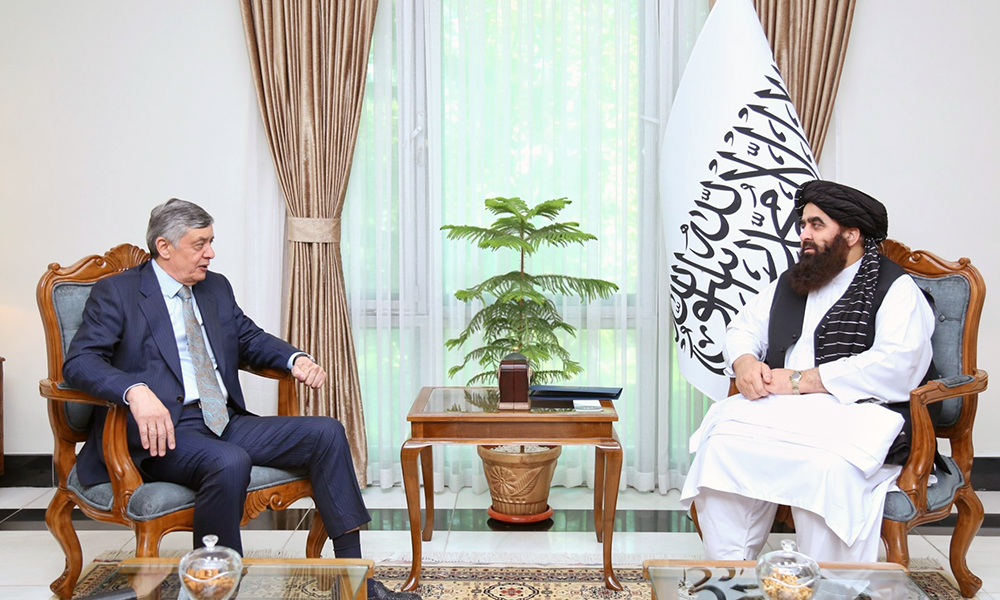
Zamir Kabulov, the Special Representative of the President of the Russian Federation for Afghanistan, who is on a visit to Kabul, has met with the Minister of Foreign Affairs of the Islamic Emirate Mawlavi Amir Khan Muttaqi for talks on political and economic issues between Afghanistan and Russia.
Regional issues were also discussed.
Muttaqi expressed appreciation for Russia’s support at regional and international meetings and emphasized the need to further strengthen political ties and trade relations between the two countries.
He also said that Afghanistan’s relations with countries in the region are flourishing and currently Afghanistan has active embassies in all neighboring countries.
Muttaqi called Afghanistan’s relations with Russia important and said the current ground realities of Afghanistan should be understood and that there is no reason why the United Nations needs to appoint a special representative to deal with Afghanistan.
He said the Afghan government is in talks with the UN over this issue and will make public its position after sufficient clarification has been provided on the agenda and composition of the next UN meeting in Doha.
Kabulov in turn stressed that any meeting held on Afghanistan should be convened with the approval of the Afghan government.
He said it is important for the United Nations to have the Afghan government approve and attend the next Doha meeting.
He said this series of meetings will not yield positive results without the Afghan government being in agreement.
He also said governments of the world should maintain relations with the Afghan government through bilateral mechanisms instead of multilateral contact mechanisms.
Kabulov emphasized that the US should release Afghanistan’s frozen assets and end its unilateral and “illegal” restrictions on the country’s banking system.
He also said Russia and Afghanistan need to improve coordination between them and went on to say he hoped Muttaqi would visit Moscow during the course of this year.
Kabulov also met with acting Minister of Interior Affairs Sirajuddin Haqqani.
This meeting focused on bilateral relations between both countries while political and security issues pertaining to the region were also discussed, the ministry said.
Latest News
Afghans in Europe Union members meet with ministers of defense, mining
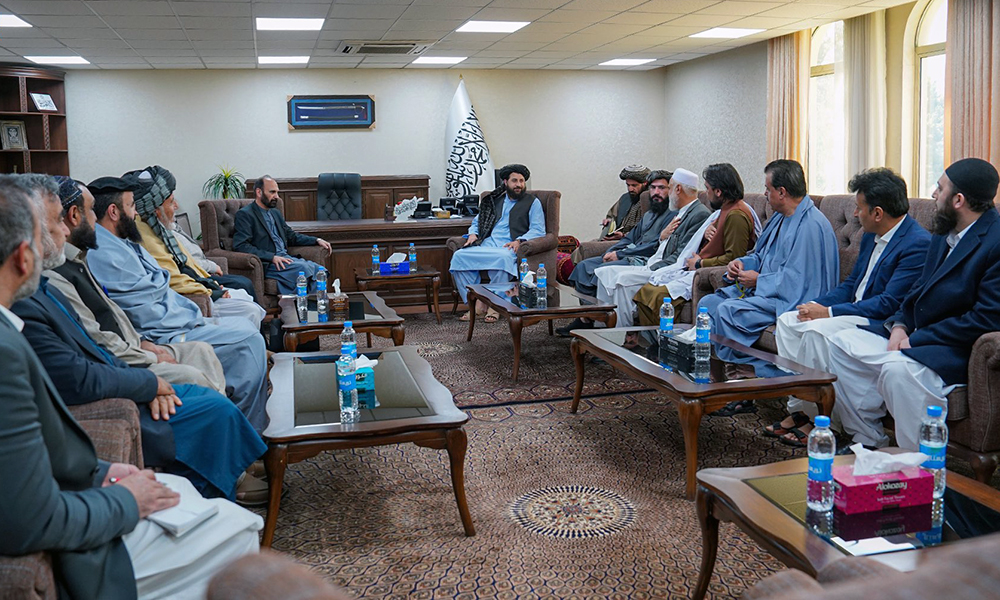
Representatives of the Union of Afghans living in Europe on Tuesday met with the ministers of defense and mining for talks on several issues.
Acting Minister of National Defense Mohammad Yaqoub Mujahid said in a meeting with union delegates that the current security situation in the country has provided an opportunity for everyone to participate in the progress of Afghanistan.
Mujahid added that there were still some problems in certain areas but that these will be removed.
In this meeting, Mujahid called Afghanistan the common home of all Afghans and said the problems in the country will be solved soon.
“The problems that exist in some issues will be solved soon; but there was nothing more than the security that has been revealed in this land today with the help of Allah and with the sacrifices of our people,” he was quoted in a statement as saying.
According to the statement, a number of Afghans, who only moved to the country after the Islamic Emirate’s takeover, expressed their satisfaction with the current situation in the country.
In addition, Shahabuddin Delawar, acting Minister of Mines and Petroleum, also met with union representatives and asked Afghans living abroad to return to Afghanistan and contribute to the country’s progress.
In this meeting, the Afghans living in Europe asked Delawar to provide better facilities to Afghans who want to invest in the country. The Ministry of Mines and Petroleum says that Delawar also asked the visiting delegation to return to Afghanistan and contribute to the country’s development.
Earlier, in a meeting with a number of other officials of the Islamic Emirate, including the political deputy of the Prime Minister and the Acting Minister of Foreign Affairs, this delegation emphasized the need to strengthen the system and provide work and education to Afghan girls and women.
Latest News
Regional developments require Afghanistan, China’s full coordination to protect interests: Muttaqi
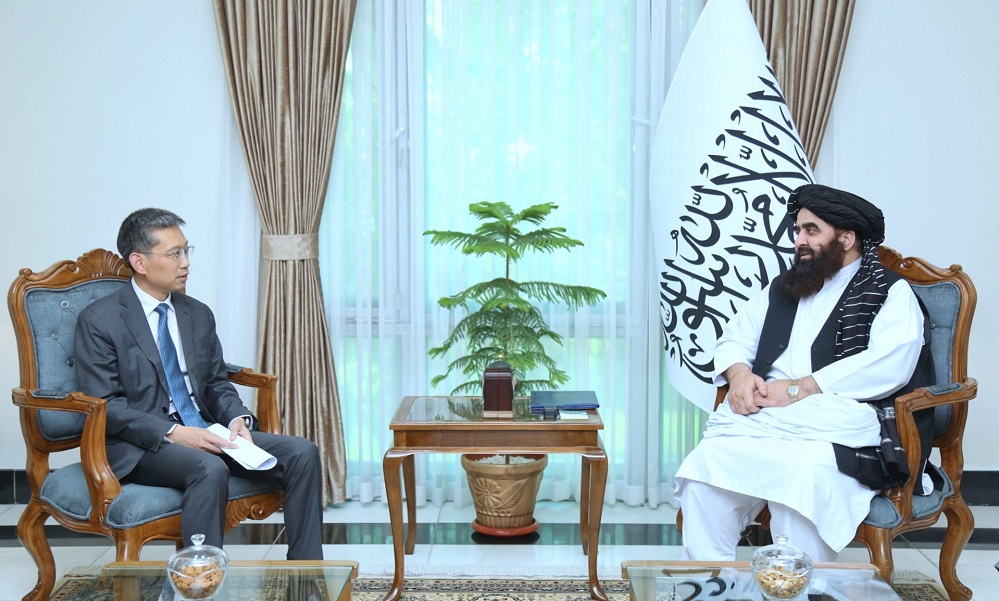
Acting Minister of Foreign Affairs Amir Khan Muttaqi has said that recent events and developments in the region require that Afghanistan and China continue their cooperation in full coordination so that they can protect their common interests.
Muttaqi stated this in a meeting with the Chinese ambassador in Kabul Zhao Xing.
The Ministry of Foreign Affairs said in a statement Tuesday that the two sides discussed bilateral political, economic and cultural cooperation between Afghanistan and China and the recent developments in the region.
Muttaqi expressed his satisfaction with the expansion of political, economic and cultural relations between the two countries and said that the Islamic Emirate has created good opportunities in the field of trade and investment.
He pointed out that the increase in the export of pine nuts to China and the progress in the Mes Aynak and Wakhan Corridor projects are clear examples of this policy of the Islamic Emirate.
According to the Ministry of Foreign Affairs’ statement, the Chinese ambassador considered the developments in various fields with Afghanistan as positive and added that he seeks to encourage Chinese businessmen and investors to play their role for long-term economic cooperation with Afghanistan.
He also said that his country is considering ways of bilateral cooperation and resources regarding Wakhan Corridor.
-

 Business5 days ago
Business5 days agoCommerce ministry inks 10 MoUs to boost development of small and medium-sized businesses
-

 Sport4 days ago
Sport4 days agoRashid Khan threatens BBL pullout after Australia postpones Afghanistan T20I series
-

 Latest News5 days ago
Latest News5 days agoOver 6,000 acres of land cleared of poppies in Badakhshan
-

 Latest News5 days ago
Latest News5 days agoMSF ‘deeply concerned’ over new phase of deportations of Afghans from Pakistan
-

 Sport3 days ago
Sport3 days agoAfghanistan Champions League kicks off with grand opening ceremony
-

 Latest News3 days ago
Latest News3 days agoPakistan’s frontiers minister stresses ‘dignified’ return of Afghan refugees
-

 Regional4 days ago
Regional4 days agoIran’s foreign minister downplays drone attack, says Tehran investigating
-

 Latest News4 days ago
Latest News4 days agoTen people killed by floods in Helmand




